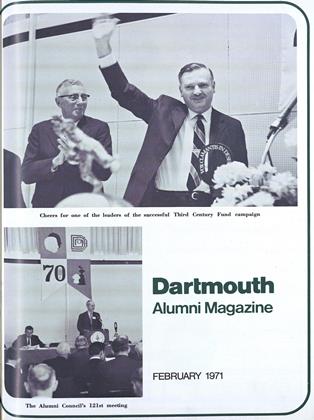Twenty-three former military medical corpsmen became special students at the Dartmouth Medical School last month and began retraining for civilian careers as physicians' assistants. They are enrolled in the Dartmouth Medex Demonstration Program, one of four such projects throughout the country established to test the viability of training the corpsmen, as assistants, to provide some basic medical care and help meet the growing demands on physicians in the field of general medicine.
The Dartmouth project, directed by Dr. Nicholas Danforth and supported by a grant from the Department of Health, Education and Welfare, is a research effort being carried out in collaboration with the New Hampshire Medical Society. After a three-month academic program at the Medical School, each Medex will begin a year of preceptorship training under the supervision of a cooperating physician in private practice in a community in one of the four northern New England states. Remote rural communities especially are expected to benefit.
In profile, the first Medex class of 23 men at Dartmouth includes 16 veterans of service in Vietnam. All four branches of the military service are represented by the candidates who come from ten states as far west as Michigan. A majority of the class has attended college and 18 are married. At least three of the wives are nurses who have applied for service at Hanover's Mary Hitchcock Memorial Hospital. While the average age is 26 years, two members of the class are 20-year career men. One corpsman already has worked in a limited capacity as a physician's assistant.
Dr. Danforth said, "The research nature of this program must be emphasized. With the support of the state medical societies, Dartmouth Medical School is utilizing its personnel and research expertise to implement a training program for physicians' assistants.
"We have selected 23 men from a pool ten times that number. Following the Dartmouth-Hitchcock Medical Center phase of training, they will work and learn under the tutelage of 23 physicians from New Hampshire, Vermont, Maine, and Massachusetts. Together with the physicians, it is our responsibility to observe the Medex within the practice and to collect and analyze the data from these observations.
"From these data we hope to answer such questions as what a physician's assistant is and where he belongs in our system of medical care, if indeed, he does belong. As with many researchers, we have a feeling of cautious optimism," Dr. Danforth said.
The Dartmouth Medex Demonstration Project is patterned after a similar experimental program in Washington State which has been expanded. The final three months of the project will be devoted to evaluation of surveys intended to measure the acceptability of the Medex by the public.
The physician-preceptors have participated in the curriculum development. Other members of the Medex faculty are physicians at the Dartmouth-Hitch- cock Medical Center.
It is anticipated that the Medex trainee will extend the service capacity of the physician-preceptor, hence the collective term Medex for the phrase in French meaning "extension of the physician." The Medex Demonstration Program is one of a number of efforts undertaken recently to train para-medical personnel to aid physicians with some of their routine, time-consuming tasks.
Each Medex will be paid a stipend and when the on-the-job training period is completed in April 1972, it is anticipated that the trainee will stay on with his physician-preceptor. Continuation of the Medex project at Dartmouth is contingent upon the effectiveness of the initial effort and federal funding.
Medical corpsmen in training are shown with Dr. Sven Gundersen
 View Full Issue
View Full Issue
More From This Issue
-
 Feature
FeatureTrustees and Alumni Council Hear 1970 Called "Great Year for Dartmouth"
February 1971 -
 Feature
FeatureThe Blackman Era: Sixteen Special Years
February 1971 By JACK DE GANGE -
 Feature
FeatureAlumni Council Nominates Three for College Trustees
February 1971 -
 Feature
FeatureAlumni Awards
February 1971 -
 Article
ArticleA Different View of Vietnam
February 1971 By STEPHEN HART '68 -
 Article
ArticleFaculty
February 1971 By WILLIAM R. MEYER







